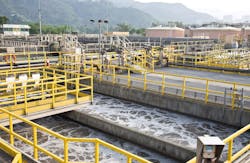Consistently maintaining compliant wastewater discharge is vitally important because wastewater treatment plants are often discharging 24 hours per day, seven days per week. Drawing acceptable official discharge permit sample results on predetermined frequencies is important and required. However, equally important is maintaining compliance with the wastewater discharge at all times. Some circumstances require a wastewater treatment plant be nimble and modify treatment procedures in response to instantaneous modifications of the incoming wastewater.
This may be a challenge for an operator. However, permanent changes might affect the quantity and tone of the influent, perhaps requiring permanent procedural changes to satisfy discharge permit limits, but also know that these recently changed procedures might need to be modified again as the influent and environmental parameters change.
For several of my industrial clients, after monitoring and analyzing the untreated influent, their existing operating procedures and the wastewater treatment results, procedure modifications were required to achieve compliant discharge. The remainder of this column illustrates examples of wastewater operating treatment modifications to improve treatment quality and meet discharge permit compliance.
Example 1
In this first industrial example, certain conditions occurred after production revisions caused the untreated wastewater conditions to revolve. Some changes to production were caused, but modifications were not made to respond to the altered influent.
Some time later, I became the operator of record, and my analysis revealed that the wastewater treatment procedures employed were not removing an adequate quantity of certain pollutants for the effluent to be compliant. Accordingly, I identified and implemented the required modifications for compliant discharge.
Example 2
In this second case, the industry secured and completed a construction permit to build. After the permit to operate was granted, I was hired as the operator of record and made responsible for performance results. This plant had no licensed operators, and its management had limited knowledge of the duties and requirements of the discharge permit.
This project called for training the management and employees to maintain and oversee all aspects of the operating procedures and the discharge permit requirements. We targeted training employees to become licensed wastewater operators, monitored and managed the wastewater treatment, and evaluated and maintained a representative discharge flow.
Later, collaborating as a team, some employees became licensed operators. Compliant wastewater discharge became the norm and overall operating expenses decreased. Today, this industrial plant operates within the parameters of its wastewater discharge permit.
Example 3
My involvement with this industrial plant began with an existing discharge permit and procedures for compliance. The foremost thing I determined was that management and plant employees had disruptions in their understanding of the requirements and did not work as a cohesive unit.
The most pressing requirement was to educate the team members responsible regarding their roles in the operating procedures to discharge compliant wastewater. We gained licensed operators and advanced work cohesion. The team implemented the required wastewater treatment operating procedures to consistently improve treatment and discharge compliant wastewater at reduced accumulated cost.
Example 4
My involvement with this project began with managing specific elements of its recently modified discharge permit. I trained the management team members and helped them work within their discharge permit, which involved a late modification that I had been requesting for a couple years. This permit modification meant that, for some of the parameters, we permitted for mass pounds of discharge only instead of being permitted on lab-result concentrations.
This change called for educating employees and management on how to monitor and supervise the flow during sampling events. After some education, this plant can now manage the flow at all times, specifically during sample events, to understand the impact of the flow along with the environmental laboratory results to achieve permit compliance. Industrial personnel have been quite successful in increasing confidence to better interpret how to operate the wastewater treatment processes to be compliant with the discharge permit.
Example 5
My interest in this industrial project began with an existing customer with a discharge permit that was getting rather hard to demonstrate compliance. The industry was permitted based upon calculated mass pounds, which gave us flexibility with the flow stream. This was a really significant consideration with this particular client because, if we were able to reduce the flow during a 24-hour time frame, that reduced flow would allow the team to have increased lab results and still maintain permit compliance.
With those conditions, we started analyzing procedures and qualified processes and methods to manage the laboratory results. One of the modifications increased the precision of chemical controls by upgrading the pumps and controllers and monitoring and determining the ongoing setpoints.
The execution of the setpoints, understanding the waste sources that affected the untreated wastewater, and the ability to handle the effluent were also important considerations once we could manage the flow and gain precise control of the effluent. With improved treatment quality, we accomplished the following:
- Significantly decreased the calculated mass pounds of discharge
- Optimized chemical use
- Decreased chemical costs while improving relations with industrial management
The regulators confirmed continued discharge permit compliance.
The results
For each example described in this column, as the wastewater treatment operating procedures and wastewater treatment solutions were evaluated, the teams and I discovered that operating procedure modifications improved wastewater treatment quality, delivered compliant discharge, enhanced operator confidence, and boosted credibility with regulators and industrial management.
Known in the industry as "Wastewater Dan," Dan Theobald, proprietor of Environmental Services, is a professional wastewater and safety consultant/trainer. He has more than 24 years of hands-on industry experience operating many variants of wastewater treatment processing units and is anxious to share his knowledge with others.



